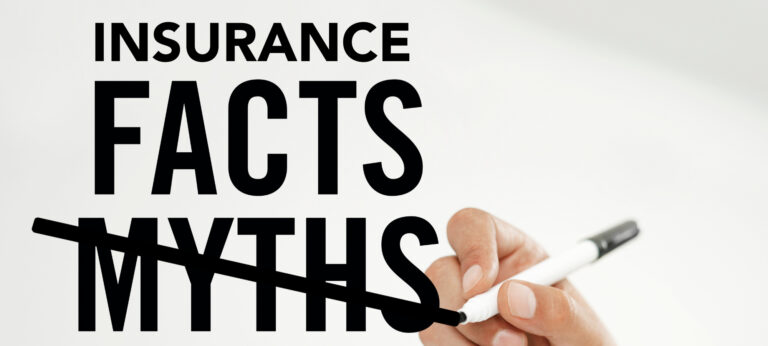Car insurance is a fundamental aspect of owning and operating a vehicle, providing financial protection against accidents, theft, and other unforeseen events. However, misconceptions and myths about car insurance abound, leading to confusion among consumers. In this comprehensive article, we will debunk some of the most common car insurance myths, providing clarity on what’s true and what’s fiction.

Myth 1: Red Cars Cost More to Insure
Fact: The color of your car has no impact on your insurance premium. Insurers determine rates based on factors such as the make and model of the vehicle, its age, engine size, safety features, and the driver’s personal driving record. While red cars may be associated with higher speeds and increased risk-taking behavior, insurers do not use the color of the vehicle as a factor in setting insurance premiums.
Myth 2: Your Insurance Covers You If Your Car is Stolen or Vandalized
Fact: Theft and vandalism are typically covered under comprehensive insurance, which is optional and not included in basic liability coverage. Comprehensive insurance covers damage to your vehicle caused by theft, vandalism, fire, weather events, and other non-collision incidents. It’s important to check your policy to ensure you have comprehensive coverage if you want protection against theft and vandalism.
Myth 3: The Minimum Coverage Required by Law Provides Sufficient Protection
Fact: Minimum liability coverage requirements vary by state and are often not sufficient to cover all potential costs in a serious accident. Minimum coverage typically covers damage and injuries you cause to others. It does not cover damage to your own vehicle or your own medical expenses. To protect yourself fully, consider additional coverages like collision, comprehensive, uninsured/underinsured motorist, and personal injury protection (PIP) if available in your state.
Myth 4: Your Insurance Premium Will Automatically Increase After Every Accident
Fact: Whether your premium increases after an accident depends on several factors, including the severity of the accident, who was at fault, your driving history, and your insurance company’s policies. Minor accidents where you are not at fault may not lead to a premium increase. However, if you are at fault for an accident or have a history of multiple claims, your premium is likely to increase to reflect the increased risk you pose to the insurer.
Myth 5: Your Credit Score Doesn’t Affect Your Insurance Premium
Fact: In many states, insurers use credit-based insurance scores to help determine premiums. Research shows a correlation between credit history and insurance risk, with individuals who have lower credit scores often paying higher premiums. Insurers argue that credit-based insurance scores help predict the likelihood of a policyholder filing a claim. However, not all states allow the use of credit scores in insurance pricing, and some insurers do not use credit scores at all.
Myth 6: Personal Auto Insurance Covers Business Use of Your Vehicle
Fact: Personal auto insurance policies typically exclude coverage for vehicles used for business purposes. If you use your vehicle for business, such as delivering goods or transporting passengers for hire, you may need a commercial auto insurance policy. Using your personal vehicle for business without the proper insurance coverage could lead to denied claims and policy cancellation.
Myth 7: Your Insurance Policy Covers Rental Cars the Same Way It Covers Your Own Car
Fact: Coverage for rental cars varies depending on your policy and the circumstances of the rental. Some policies extend coverage to rental cars, but often this coverage is limited to the same level as your own vehicle. It may not cover certain fees charged by rental companies, like loss of use charges or diminution of value. It’s essential to review your policy or contact your insurer before renting a car to understand your coverage and whether you need additional insurance from the rental company.
Myth 8: Older Drivers Always Pay More for Insurance
Fact: While it’s true that younger drivers often face higher premiums due to their limited driving experience and higher accident rates, older drivers do not necessarily pay more solely based on age. Factors such as driving record, type of vehicle, and annual mileage play significant roles in determining premiums for older drivers. Additionally, many insurers offer discounts for mature drivers who complete defensive driving courses or have a clean driving record.
Myth 9: Your Insurance Will Cover Personal Items Stolen from Your Car
Fact: Personal belongings stolen from your car, such as laptops, phones, or bags, are typically not covered under your auto insurance policy. These items may be covered by your homeowner’s or renter’s insurance policy, subject to deductibles and coverage limits. It’s advisable to review your homeowner’s or renter’s policy to understand the coverage for personal belongings both inside and outside your home.
Myth 10: You Can Cancel Your Insurance Policy Anytime Without Consequences
Fact: While you can generally cancel your insurance policy at any time, doing so may result in penalties or fees depending on your insurer’s policies and state regulations. Additionally, driving without insurance or allowing coverage to lapse can lead to legal consequences, including fines and license suspension. If you plan to switch insurers or cancel your policy, it’s essential to coordinate the timing to avoid gaps in coverage.
Conclusion
Navigating the world of car insurance can be complex, especially when faced with misinformation and myths. By understanding the facts behind common car insurance myths, you can make informed decisions about your coverage needs and ensure you have the protection you need without overpaying. Remember to review your policy regularly, compare quotes from different insurers, and ask questions to clarify any uncertainties. With the right knowledge, you can drive confidently knowing you’re adequately protected against life’s uncertainties on the road.
